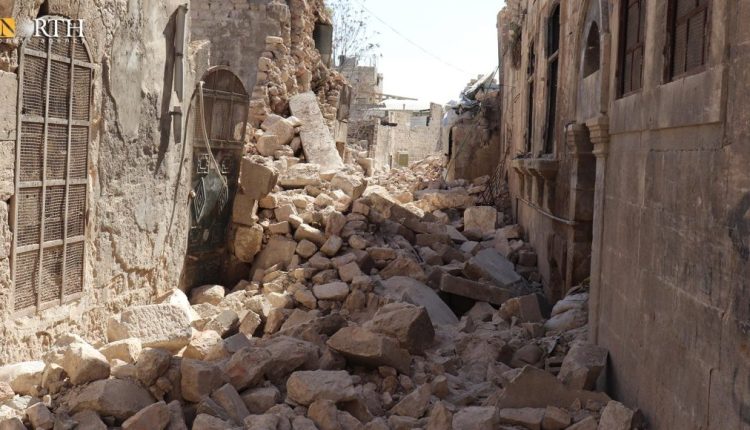
By Ardo Juweid
ALEPPO, Syria (North Press) – After a year of the devastating earthquake that hit Syria and Iraq last February, Hamdan Fadawi, 62, from Qadi Askar neighborhood in the city of Aleppo, northwest Syria, cannot go back to his house which is damaged in the quake, especially in the light of the decisions of the Syrian government that do not allow people to re-build their houses without engineering supervision.
Horrible moments the residents of Aleppo experienced at the time and they still suffer from the disaster. They have not received any compensation from the government despite too much decisions that stipulate providing psychological and financial support.
The quake that hit Syria and Turkey on Feb. 6, 2023 resulted in the destruction of 54 inhabited buildings in the government-held areas in Aleppo, death of 432 people, and injury of 714 others.
The council of the city demolished about 300 damaged buildings that were posing risk on residents, as they harmed over 13,000 families.
On Feb. 10, the Syrian government announced the areas hit by the quake as “disaster area”.
Benefits of the quake
Fadawi told North Press that the government took advantage of the quake, as it seized the international assistance provided for the earthquake-affected people.
The government took advantage of each application of re-building houses. “The government capitalizes on each application, ignoring the residents suffering,” he said.
Fadawi applied for the government to rehabilitate his house, but his application was denied because only the total rehabilitation operations were accepted and Fadawi’s house need partial restoration.
Syrian Engineering Association in Aleppo formed about 115 committees to collaborate with the city council to decide the affected buildings. They recorded 1,570 houses in Qadi Askar neighborhood and still conducting intermittent assessing processes to return residents whose houses are safe.
They demolished 413 dangerous building that need to be re-build. The number of safe buildings has reached 17,742 ones, while the number of families that left their houses has reached 863.
Fake procedures
In March 2023, the government issued a legislative decree exempting the quake-affected people from paying taxes and providing them a chance to get interest-free loans.
On May 1, Syrian President Bashar al-Assad issued a decree to establish a National Fund to support the quake-affected people at the aim of providing financial support for the affected people.
Arab and Foreign countries provided aid to alleviate the crisis that hit the Syrian people that already suffers from war and displacement.
Iraq provided prefabricated houses, however, the concerned authorities halted the implementation of the project due to insufficient budget for over 150 houses in the eastern countryside of Aleppo.
For its part, the government issued early 2024 a decision to end the prefabricated rooms which were announced on Feb. 10, 2023.
Raouf al-Ali, political analyst from Aleppo, told North Press that the survivors have not received financial support that enables them to return to normal life. This worsens their situation and poses unbearable burdens over them.
“Due to the deteriorating political and economic situation in the city, the rehabilitation process was not supported,” al-Ali said. “Due to the increasing debts and unemployment, a lot of people are unable to get the loans needed to re-build their destroyed houses.”
The political analyst said that the government and concerned organizations should give the priority to the quake-impacted people in Aleppo and work on providing financial compensations and necessary efforts.
“It is essential to take the necessary measures to improve the living conditions and revive hope in the hearts of those who experienced the quake,” he said.
